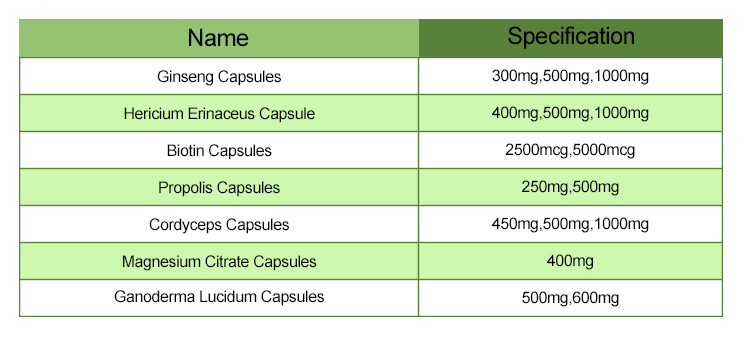Biotin capsules typically contain biotin as the active ingredient. Biotin, also known as vitamin B7 or vitamin H, is a water-soluble vitamin that plays a crucial role in various metabolic processes in the body, particularly in the metabolism of fats, carbohydrates, and amino acids.
In addition to biotin, other ingredients commonly found in biotin capsules may include:
Fillers: These are inactive ingredients used to bulk up the capsule and ensure proper dosage. Common fillers include cellulose, rice flour, or maltodextrin.
Binders: Binders help hold the ingredients together and maintain the shape of the capsule. Examples include gelatin or cellulose derivatives.
Lubricants: Lubricants are added to prevent the ingredients from sticking to the machinery during the manufacturing process and to improve the flow of the powder inside the capsule. Magnesium stearate and stearic acid are common lubricants.
Anti-caking agents: These agents prevent the ingredients from clumping together and ensure uniform distribution. Silicon dioxide is a commonly used anti-caking agent.

Other additives: Depending on the manufacturer and formulation, biotin capsules may also contain additional vitamins, minerals, or herbal extracts that complement the effects of biotin or serve other health purposes.
It’s essential to read the label and consult with a healthcare professional before taking any supplement to ensure it’s appropriate for your individual needs and to avoid potential interactions with medications or existing health conditions.
The application of Biotin Capsules
Biotin, also known as vitamin B7 or vitamin H, is a water-soluble B vitamin that plays a crucial role in various bodily functions. Biotin is commonly found in foods such as eggs, nuts, seeds, and certain vegetables, and it can also be taken as a dietary supplement in the form of capsules.
The application of biotin capsules can vary depending on individual needs and health conditions. Here are some common uses and benefits of biotin capsules:
Hair Health: Biotin is often touted as a supplement for promoting healthy hair growth and reducing hair loss. While research on this is somewhat limited, some studies suggest that biotin supplements may help improve the strength and thickness of hair strands.
Nail Health: Biotin is also believed to support healthy nail growth and strength. Some people take biotin supplements to address brittle nails or to prevent nail splitting.
Skin Health: Biotin is involved in the metabolism of fatty acids, which are important for maintaining healthy skin. Some individuals take biotin supplements to improve skin health, although scientific evidence supporting this claim is still emerging.
Metabolism Support: Biotin plays a crucial role in the metabolism of carbohydrates, fats, and proteins. Some people take biotin supplements to support their metabolism and energy levels.

Pregnancy and Breastfeeding: Biotin is important for fetal development during pregnancy, so pregnant women may require higher biotin intake. Biotin supplements are generally considered safe for pregnant and breastfeeding women when taken at recommended doses.
When using biotin capsules, it’s essential to follow the recommended dosage provided on the product label or as directed by a healthcare professional. Taking excessive amounts of biotin supplements can potentially lead to adverse effects or interactions with medications. Additionally, it’s important to note that while biotin supplements are generally safe for most people, individuals with certain medical conditions should consult their healthcare provider before starting supplementation.
Overall, biotin capsules can be a convenient way to ensure an adequate intake of this essential vitamin, especially for individuals who may have dietary restrictions or difficulty obtaining enough biotin from food sources alone. However, it’s important to remember that supplements should complement a balanced diet and healthy lifestyle, rather than replace it entirely.
